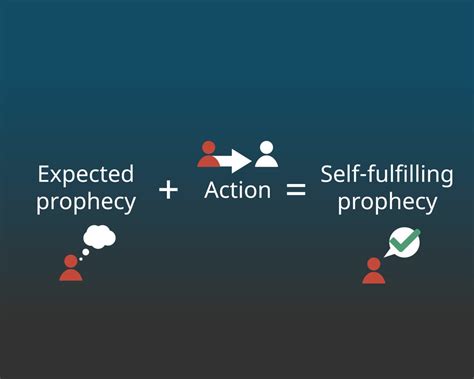What is a Self-Fulfilling Prophecy?
In AP Psychology, a self-fulfilling prophecy is a belief that leads to its own fulfillment. This can occur in two ways:

- Positive Self-Fulfilling Prophecy: A belief in one’s own abilities leads to behaviors that ultimately confirm the belief.
- Negative Self-Fulfilling Prophecy: A belief in one’s own limitations leads to behaviors that ultimately confirm the belief.
Key Points
- Self-fulfilling prophecies are often based on stereotypes or expectations.
- They can affect individuals’ behavior, self-concept, and performance.
- Both positive and negative self-fulfilling prophecies can occur.
- The Pygmalion effect is a classic example of a positive self-fulfilling prophecy in education.
- Self-fulfilling prophecies can have significant consequences for individuals and society.
Examples of Self-Fulfilling Prophecies
- Positive: A student who believes they can succeed in math will study harder and perform better in class, confirming their initial belief.
- Negative: A person who believes they are a “bad driver” may drive more cautiously, leading to mistakes that reinforce their belief.
Causes of Self-Fulfilling Prophecies
- Expectancy: The belief that a certain outcome is likely to occur.
- Confirmation Bias: The tendency to seek out information that confirms existing beliefs.
- Social Norms: Expectations and behaviors that are influenced by society.
- Self-Concept: Beliefs about one’s own abilities and worth.
Consequences of Self-Fulfilling Prophecies
Positive:
- Increased motivation and confidence
- Improved performance
- Greater sense of control
Negative:
- Decreased motivation and self-esteem
- Poor performance
- Increased anxiety and stress
Breaking the Cycle of Self-Fulfilling Prophecies
- Identify Negative Beliefs: Recognize and challenge negative self-beliefs.
- Focus on Positive Thoughts: Cultivate positive beliefs and counteract negative ones.
- Set Realistic Goals: Break down large goals into smaller, achievable steps to avoid discouragement.
- Seek Support: Surround yourself with supportive people who believe in you.
- Practice Positive Self-Talk: Use positive language to encourage and motivate yourself.
Applications of Self-Fulfilling Prophecies
- Education: Teachers can create a positive classroom climate by expressing high expectations for students.
- Workplace: Leaders can motivate employees by setting clear goals and providing positive feedback.
- Therapy: Therapists can help clients identify and challenge negative self-fulfilling prophecies.
- Interpersonal Relationships: People can build healthy relationships by assuming the best in others and treating them with respect.
Conclusion
Self-fulfilling prophecies are a powerful force that can shape our lives and experiences. By understanding the principles behind them, we can harness their power to create positive outcomes for ourselves and others. By breaking the cycle of negative self-fulfilling prophecies and cultivating positive ones, we can unlock our potential and create a more fulfilling life.
Additional Resources
- The Self-Fulfilling Prophecy
- How Self-Fulfilling Prophecies Work
- Breaking the Cycle of Self-Fulfilling Prophecies
Tables
Table 1: Characteristics of Self-Fulfilling Prophecies
| Characteristic | Description |
|---|---|
| Expectation | Belief that a certain outcome is likely to occur |
| Confirmation Bias | Tendency to seek out information that confirms existing beliefs |
| Social Norms | Expectations and behaviors that are influenced by society |
| Self-Concept | Beliefs about one’s own abilities and worth |
| Positive | Leads to positive behaviors and outcomes |
| Negative | Leads to negative behaviors and outcomes |
Table 2: Examples of Self-Fulfilling Prophecies in Education
| Example | Effect |
|---|---|
| Teacher expects students to succeed | Students perform better |
| Teacher expects students to fail | Students perform worse |
| Student believes they are good at math | Studies harder and performs better |
| Student believes they are bad at reading | Avoids reading and performs poorly |
Table 3: Consequences of Self-Fulfilling Prophecies
| Consequence | Description |
|---|---|
| Positive | Increased motivation, improved performance, greater sense of control |
| Negative | Decreased motivation, poor performance, increased anxiety and stress |
Table 4: Breaking the Cycle of Self-Fulfilling Prophecies
| Strategy | Description |
|---|---|
| Identify Negative Beliefs | Recognize and challenge negative self-beliefs |
| Focus on Positive Thoughts | Cultivate positive beliefs and counteract negative ones |
| Set Realistic Goals | Break down large goals into smaller, achievable steps |
| Seek Support | Surround yourself with supportive people who believe in you |
| Practice Positive Self-Talk | Use positive language to encourage and motivate yourself |
